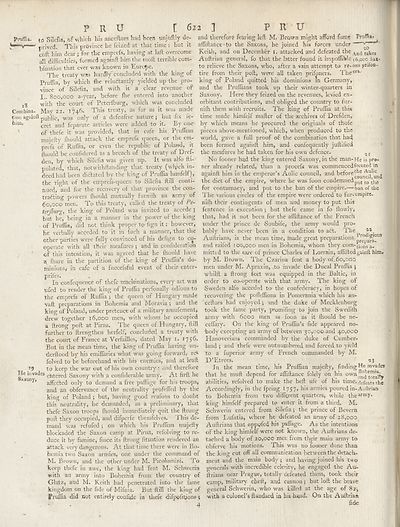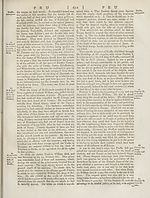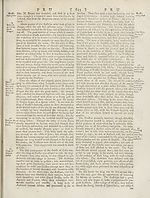Encyclopaedia Britannica > Volume 15, PLA-RAM
(690) Page 622
Download files
Complete book:
Individual page:
Thumbnail gallery: Grid view | List view

p
R U
[ 622 ]
P R ' U
pmflia. (o Silefia, of which his anceflors had been unjuftly de-
—"V prived. This province he feized at that time : but it
coft him dear; for the emprefs, having at laft overcome
aJl difficulties, formed againft him the moil terrible com¬
bination that ever was known m liurope.
Xhe treaty was hardly' concluded with the king of
Pruffia, by which flie reluctantly yielded up the pro
vince of Sileha, and with it a clear
of
18
1,. 800,000 a-year, before (he entered into another
with the court of Peterfburg, which was concluded
Combina- blay 22. I his treaty, as far as it was made
tion agaiuft public, was only of a defenfive nature ; but fix le-
hmi. cret and feparate articles were added to it. By one
of thefe it was provided, that in cafe his Pruffian
majelty ffiould attack the emprefs queen, or the em-
preis of Ruffia, or even the republic of Poland, it
ffiould be confidered as a breach of the treaty of Dref-
den, by which Silelia was given up. It was alfo fh-
pulated, that, notwithftanding that treaty (which in¬
deed had been di&ated by the king of Pruffia himfelf),
the right of the emprefs-queen to Silefia ftill conti¬
nued, and for the recovery of that province the con-
trafting powers fliould mutually furnilh an army of
60,000 men. To this treaty, called the treaty of Pe-
terjburg, the king of Poland was invited to accede ;
but he, being in a manner in the power of the king
of Pruffia, did not think proper tp fign it: however,
he verbally acceded to it in iuch a manner, that the
other parties were fully convinced of his defign to co¬
operate with all their rneafures ; and in confideration
of this intention, it was agreed that he Ihould have
a {hare in the partition of the king of Pruffia’s do¬
minions, in cafe of a fuccefsful event of their enter-
prifes.
In confequence of thefe machinations, every art was
ufed to render the king of Pruffia perlonally odious to
the emprefs of Ruffia; the queen of Hungary made
vaft preparations in Bohemia and Moravia ; and the
king of Poland, under pretence of a military amufement,
drew together 16,000 men, w'ith wffiom he occupied
a ftrong poll at Pirna. The queen of Hungary, ilill
further to ftrengthen herfelf, concluded a treaty with
the court of France at Verfailles, dated May 1. 17 56*
But in the mean time, the king of Pruffia having un-
derftood by his emiffaries what was going forward, re*,
folved to be beforehand with his enemies, and at leafl
to keep the w ar ovit of his own country • and therefore
entered Saxony w'ith a conliderable army. At firft he
affected only to demand a free paffage for his troops,
and an obfervance of the neutrality profeffed by the
king of Poland ; but, having good reatons to doubt
this neutrality, he demanded, as a preliminary, that
thefe Saxon troops ffiould immediately quit the itrong
poll they occupied, and difperfe themfelves. This de¬
mand was refufed ; on which his Pruffian majelty
blockaded the Saxon camp at Pirna, refolving to re¬
duce it by famine, fince. its lining lituation rendered an
attack very dangerous. At that time there were in Bo¬
hemia two Saxon armies, one under the command of
M. Brown, and the other under M. Picolomini, To
keep thefe in awe, the king had fent M. Schwerin
with an army into Bohemia from the country of
Glatz, and M. Keith had penetrated into the fame
kingdom on the fide of Mifnia. But ftill the king of
Shuilia did not entirely confide in thefe difpoiiOons ;
4
*9
He invades
Saxony,
and therefore fearing left M. Brown might afford fame Pniffu*
affiltance ■ to the Saxons, he joined his forces under ^
Keith, and on December 1. attacked and defeated the An(^ takes
Auftrian general, fo that the latter found it impoffible I6,oco Sal¬
to relieve the Saxons, wTho, after a vain attempt to re-ons priloa-
tire from their poft, were all taken prifpners. Theer9-
king of Poland quitted his dominions in Germany,
and the Pruffians took up their winter-quarters in
Saxony. Here they feized on the revenues, levied ex¬
orbitant contributions, and obliged the country to fur-
niffi them with recruits. The king of Pruffia at this
time made himleli mailer of the archives ol Drefden,
by which means lie procured the originals of thole
pieces above-mentioned, which, wrhen produced to the
world, gave a full proof of the combination that had
been formed againft him, and confequently juftified
the meafures he had taken for his own defence.
No fooner had the king entered Saxony, in the man-He is pr»-
ner already related, than a procefs was commenced fecuted in
againft him in the emperor’s Aulic council, and beforej
the diet of the empire, where he was foon condemned put t0 ^
for contumacy, and put to the ban ot the empire.— ban of the
The various circles of the empire were ordered to fur-empire,
niffi their contingents of men and money to put this
fentence in execution ; hut thefe came in fo (lowly,
that, had it not been for the affiftance of the French
under the prince de Soubife, the army would pro¬
bably have never been in a condition to act. The 2’3’.
Auftrians, in the mean time, made great preparations
and railed 100,000 men in Bohemia, whom they com-tjonsa_
mitted to the care of prince Charles of Borrain, affiftedgainft him#
by M. Brown. The Czarina fent a body of.6o,coo
men under M. Apraxin, _to invade the Ducal Pruffia ;
whilit a ftrong ieet w’as equipped in the Baltic, in
order to co-opente with that army. The king of
Sweden alfo acceded to the confederacy, in hopes of
recovering the polleffions in Pomerania which his an-
ceftors had enjoyed ; and the duke of Mecklenburg
took the lame party, promiftng to join the Swedifh
army with 6000 men as loon as it ihould be ne-
ceflary. On the king of Pruffia’s fide appeared no¬
body excepting an army of between 30,000 and 40,000
Hanoverians commanded by the duke of Cumber¬
land ; and thefe were outnumbered and forced to yield
to a fuperior army of French commanded by M.
D’Etrees. rjj
In the mean time, his Pruffian majefty, finding He invades
that he mult depend for affiftance folely on his own
abilities, refolved to make the bell ufe of his time, defeats the
Accordingly, in the fpring 1757, his armies poured in-Auftrian
to Bohemia from two different quarters, while the army.
king himfelf prepared to enter it from a third. M.
Schwerin entered from Silefia; the prince of Bevern
from Lufatia, where he defeated an army of 28,000
Auftrians that ©ppyfed his paflage. As the intentions
of the king himielf were not known, the Auftrians de¬
tached a body of 20,000 men from their main army to
obferve his motions. This was no fooner done than
the king cut off’ all communication between the detach¬
ment and the main body; and having joined his two
generals with incredible celerity, he engaged the Au¬
ftrians near Prague, totally defeated them, took their
camp, military cheft, and cannon ; but loft the brave
general Schwerin, who was killed at the age of 82,
with a colonel’s ftandard in hia hand. On the Auftrian
fide
R U
[ 622 ]
P R ' U
pmflia. (o Silefia, of which his anceflors had been unjuftly de-
—"V prived. This province he feized at that time : but it
coft him dear; for the emprefs, having at laft overcome
aJl difficulties, formed againft him the moil terrible com¬
bination that ever was known m liurope.
Xhe treaty was hardly' concluded with the king of
Pruffia, by which flie reluctantly yielded up the pro
vince of Sileha, and with it a clear
of
18
1,. 800,000 a-year, before (he entered into another
with the court of Peterfburg, which was concluded
Combina- blay 22. I his treaty, as far as it was made
tion agaiuft public, was only of a defenfive nature ; but fix le-
hmi. cret and feparate articles were added to it. By one
of thefe it was provided, that in cafe his Pruffian
majelty ffiould attack the emprefs queen, or the em-
preis of Ruffia, or even the republic of Poland, it
ffiould be confidered as a breach of the treaty of Dref-
den, by which Silelia was given up. It was alfo fh-
pulated, that, notwithftanding that treaty (which in¬
deed had been di&ated by the king of Pruffia himfelf),
the right of the emprefs-queen to Silefia ftill conti¬
nued, and for the recovery of that province the con-
trafting powers fliould mutually furnilh an army of
60,000 men. To this treaty, called the treaty of Pe-
terjburg, the king of Poland was invited to accede ;
but he, being in a manner in the power of the king
of Pruffia, did not think proper tp fign it: however,
he verbally acceded to it in iuch a manner, that the
other parties were fully convinced of his defign to co¬
operate with all their rneafures ; and in confideration
of this intention, it was agreed that he Ihould have
a {hare in the partition of the king of Pruffia’s do¬
minions, in cafe of a fuccefsful event of their enter-
prifes.
In confequence of thefe machinations, every art was
ufed to render the king of Pruffia perlonally odious to
the emprefs of Ruffia; the queen of Hungary made
vaft preparations in Bohemia and Moravia ; and the
king of Poland, under pretence of a military amufement,
drew together 16,000 men, w'ith wffiom he occupied
a ftrong poll at Pirna. The queen of Hungary, ilill
further to ftrengthen herfelf, concluded a treaty with
the court of France at Verfailles, dated May 1. 17 56*
But in the mean time, the king of Pruffia having un-
derftood by his emiffaries what was going forward, re*,
folved to be beforehand with his enemies, and at leafl
to keep the w ar ovit of his own country • and therefore
entered Saxony w'ith a conliderable army. At firft he
affected only to demand a free paffage for his troops,
and an obfervance of the neutrality profeffed by the
king of Poland ; but, having good reatons to doubt
this neutrality, he demanded, as a preliminary, that
thefe Saxon troops ffiould immediately quit the itrong
poll they occupied, and difperfe themfelves. This de¬
mand was refufed ; on which his Pruffian majelty
blockaded the Saxon camp at Pirna, refolving to re¬
duce it by famine, fince. its lining lituation rendered an
attack very dangerous. At that time there were in Bo¬
hemia two Saxon armies, one under the command of
M. Brown, and the other under M. Picolomini, To
keep thefe in awe, the king had fent M. Schwerin
with an army into Bohemia from the country of
Glatz, and M. Keith had penetrated into the fame
kingdom on the fide of Mifnia. But ftill the king of
Shuilia did not entirely confide in thefe difpoiiOons ;
4
*9
He invades
Saxony,
and therefore fearing left M. Brown might afford fame Pniffu*
affiltance ■ to the Saxons, he joined his forces under ^
Keith, and on December 1. attacked and defeated the An(^ takes
Auftrian general, fo that the latter found it impoffible I6,oco Sal¬
to relieve the Saxons, wTho, after a vain attempt to re-ons priloa-
tire from their poft, were all taken prifpners. Theer9-
king of Poland quitted his dominions in Germany,
and the Pruffians took up their winter-quarters in
Saxony. Here they feized on the revenues, levied ex¬
orbitant contributions, and obliged the country to fur-
niffi them with recruits. The king of Pruffia at this
time made himleli mailer of the archives ol Drefden,
by which means lie procured the originals of thole
pieces above-mentioned, which, wrhen produced to the
world, gave a full proof of the combination that had
been formed againft him, and confequently juftified
the meafures he had taken for his own defence.
No fooner had the king entered Saxony, in the man-He is pr»-
ner already related, than a procefs was commenced fecuted in
againft him in the emperor’s Aulic council, and beforej
the diet of the empire, where he was foon condemned put t0 ^
for contumacy, and put to the ban ot the empire.— ban of the
The various circles of the empire were ordered to fur-empire,
niffi their contingents of men and money to put this
fentence in execution ; hut thefe came in fo (lowly,
that, had it not been for the affiftance of the French
under the prince de Soubife, the army would pro¬
bably have never been in a condition to act. The 2’3’.
Auftrians, in the mean time, made great preparations
and railed 100,000 men in Bohemia, whom they com-tjonsa_
mitted to the care of prince Charles of Borrain, affiftedgainft him#
by M. Brown. The Czarina fent a body of.6o,coo
men under M. Apraxin, _to invade the Ducal Pruffia ;
whilit a ftrong ieet w’as equipped in the Baltic, in
order to co-opente with that army. The king of
Sweden alfo acceded to the confederacy, in hopes of
recovering the polleffions in Pomerania which his an-
ceftors had enjoyed ; and the duke of Mecklenburg
took the lame party, promiftng to join the Swedifh
army with 6000 men as loon as it ihould be ne-
ceflary. On the king of Pruffia’s fide appeared no¬
body excepting an army of between 30,000 and 40,000
Hanoverians commanded by the duke of Cumber¬
land ; and thefe were outnumbered and forced to yield
to a fuperior army of French commanded by M.
D’Etrees. rjj
In the mean time, his Pruffian majefty, finding He invades
that he mult depend for affiftance folely on his own
abilities, refolved to make the bell ufe of his time, defeats the
Accordingly, in the fpring 1757, his armies poured in-Auftrian
to Bohemia from two different quarters, while the army.
king himfelf prepared to enter it from a third. M.
Schwerin entered from Silefia; the prince of Bevern
from Lufatia, where he defeated an army of 28,000
Auftrians that ©ppyfed his paflage. As the intentions
of the king himielf were not known, the Auftrians de¬
tached a body of 20,000 men from their main army to
obferve his motions. This was no fooner done than
the king cut off’ all communication between the detach¬
ment and the main body; and having joined his two
generals with incredible celerity, he engaged the Au¬
ftrians near Prague, totally defeated them, took their
camp, military cheft, and cannon ; but loft the brave
general Schwerin, who was killed at the age of 82,
with a colonel’s ftandard in hia hand. On the Auftrian
fide
Set display mode to:
![]() Universal Viewer |
Universal Viewer | ![]() Mirador |
Large image | Transcription
Mirador |
Large image | Transcription
Images and transcriptions on this page, including medium image downloads, may be used under the Creative Commons Attribution 4.0 International Licence unless otherwise stated. ![]()
| Encyclopaedia Britannica > Encyclopaedia Britannica > Volume 15, PLA-RAM > (690) Page 622 |
|---|
| Permanent URL | https://digital.nls.uk/191909746 |
|---|
| Attribution and copyright: |
|
|---|
| Description | Ten editions of 'Encyclopaedia Britannica', issued from 1768-1903, in 231 volumes. Originally issued in 100 weekly parts (3 volumes) between 1768 and 1771 by publishers: Colin Macfarquhar and Andrew Bell (Edinburgh); editor: William Smellie: engraver: Andrew Bell. Expanded editions in the 19th century featured more volumes and contributions from leading experts in their fields. Managed and published in Edinburgh up to the 9th edition (25 volumes, from 1875-1889); the 10th edition (1902-1903) re-issued the 9th edition, with 11 supplementary volumes. |
|---|---|
| Additional NLS resources: |
|

